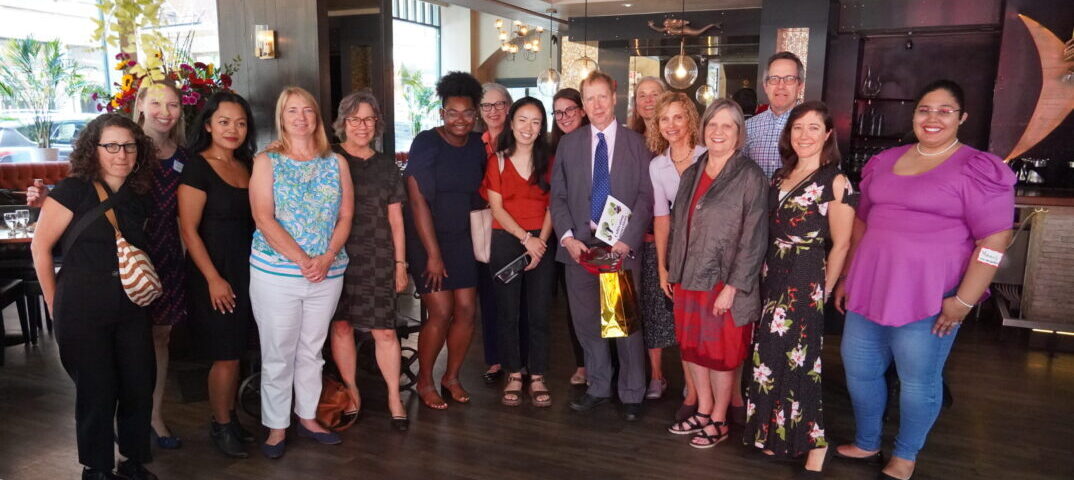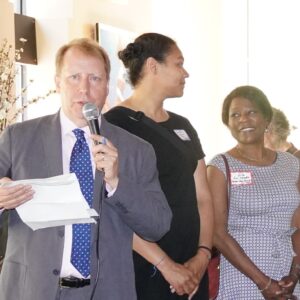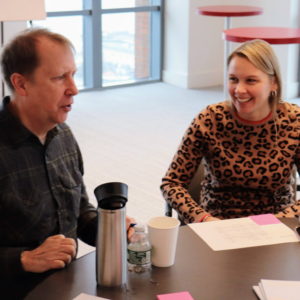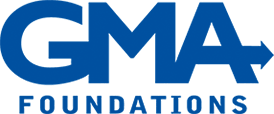
Director of Grantmaking Phil Hall is retiring after 36 years at GMA. How have things changed? What are his hopes for the future? Phil shares a bit of hard-earned perspective, grounded in his love of music – and philanthropy.
Tell us how you got into philanthropy and to Grants Management Associates, as GMA was known in the olden days.
Before joining GMA in 1988, I was just married and had a job in the science library at Boston University. I had earned a master’s degree in piano performance there, studying with the great pianist Boris Berman. I had to start thinking seriously about my life and a career—not that music isn’t a serious thing.
Philanthropy wasn’t something I had intended to do. I was just looking for a decent-paying job. A headhunter named Allison sent me on two interviews – one at a funeral home, the other at GMA. The job in philanthropy seemed like an interesting way to make a living and it resonated deeply with my personal values, aligning with my youthful desire to work for a better world.
I was completely charmed by the founders of Grants Management Associates—Mary Philips, Newell Flather, and Ala Reid. When I started, GMA was still very much a startup and in a growth spurt. Each new client was an adventure, and we lavished them with attention—something I hope persists today. It was an exciting time! GMA was on the cutting edge of something new and significant in the philanthropic landscape.
Given that music is a significant part of your identity, do you see a connection between music and philanthropy?
Initially, I didn’t see any connection between my love for music and my new job, and usually kept the two worlds separate. Over the years, I noticed significant overlap and connection. Both music and grantmaking involve a deep awareness of human vulnerability—apparent in great composers like Mozart, Beethoven, and Schubert and also in the sort of nonprofit activity we support. Just as abstract music can be more truthful than the words we speak, behind every written grant application is a human story of need, hope, and aspiration. There’s a genuine expression of love and care in the grantmaking work we do, mirroring the emotional depth found in music.

Another parallel is the presence of multiple voices. In classical music, as in jazz, various voices intertwine to create a rich, complex but unified message. In grantmaking, we see a similar dynamic. There are the voices of the reviewers and the applicants, and of the foundation board members, all with their perspectives and needs. As philanthropic advisors, we (GMA) often come to a meeting with specific recommendations only to find our clients have differing and sometimes better views. Philanthropy, like the practice of law (and love), comes with a healthy dose of not getting your way.
You’ve accomplished so much at GMA! What grant programs make you most proud?
I had a lot of adventures in Lowell supporting the Parker Foundation, managing numerous terrific grants, including some for signature projects at UTEC, the Cambodian Mutual Assistance Association, the Jericho Road Project, and the Lowell Community Health Center, and for the creation of the Greater Lowell Community Foundation.
A formative first experience for me was The Dudley Street Neighborhood Initiative, which transformed an entire community. I was there from the beginning, on behalf of the Riley Foundation, watching it unfold, and seeing the power of community control, as facilitated by master community organizers like Peter Medoff and Gus Newport, as well as DSNI board president Che Madyun.
A few systemic things also make me reasonably proud. As GMA Foundations added more and more clients, we needed to better understand their funding interests. This led to the development of a grants data collection system. The resulting lists, detailing clients’ grants, highlight significant grantmaking themes that change annually, offering a big-picture, composite view of giving. Behind every grants list is a story, and the story of stories is pretty interesting.
I am also pleased with the creation of the GMA Funder Community. In our work with small funders, we don’t always get to delve into large complex issues like the opioid crisis, child behavioral health, climate change, and guaranteed income. The funder community is a rich environment for learning and pooled giving. With the counsel of experts, we’re finding ways to support innovative organizations addressing intractable challenges at a local level. The funder community also provides GMA staff with a sabbatical-like experience – leading a collaborative effort beyond GMA. I’ve found great fulfillment in my unexpected role as fundraiser – a surprisingly rich form of networking and learning.
What advice would you offer to your colleagues and others working in philanthropy?
In general, respect and nurture your curiosity and individual intelligence. Grantmaking provides a fantastic learning opportunity at many different levels, including the personal, and you bring something into the equation.

I am not a blind fan of trust-based philanthropy, our newest fad. However – I am supportive of flexible funding and sustained support, which carries an opportunity cost in terms of accessibility to other grantseekers—fine so long as you can live with it. But, as in any healthy relationship, trust doesn’t spring from neglect.
Program officers should be able to speak intelligently about the fundamentals I am always harping on at GMA: organizational background, leadership and finance, current agenda, the future vision. If this basic knowledge can be achieved while easing the burden placed on our grantees, it’s obviously a good thing. A single generic proposal, created on an annual basis and modified lightly as needed, might be a step in the right direction, followed, of course, by a brief conversation between funder and grantee. Again, a relationship is not a one-sided thing.
What will you miss most about GMA? Do you have any plans for retirement?
The thing I’ll miss most deeply is the incredible staff who have been like family to me. GMA is an employee-led, mission-driven company, and this ethos has created a supportive and empowering environment, involving, occasionally, some healthy disagreement (counterpoint again).
I’ll also miss the intellectual stimulus that comes from reviewing applications and meeting with people in the larger funder community. Working with a wide range of clients, each with their unique perspectives, has been both rewarding and enlightening. The chance to explore different approaches to addressing world issues has been incredibly liberating (counterpoint!).
I’m now looking forward to the freedom in this new stage of life. It’s a time for me to focus on my own interests, and to spend more time with family and friends. While I will no longer be working at GMA, I plan to stay reasonably informed about nonprofit activities and philanthropy. All times are bad (if you want to look at life that way), and the current political situation is dysfunctional to the point of being frightening. Still, I remain hopeful for the future. Our best grantees taught me to adopt this view.
Pailey Feakes compiled these notes from her June 2024 conversation with Phil Hall, GMA’s Director of Grantmaking for many years, just before he wrapped up his tenure.
